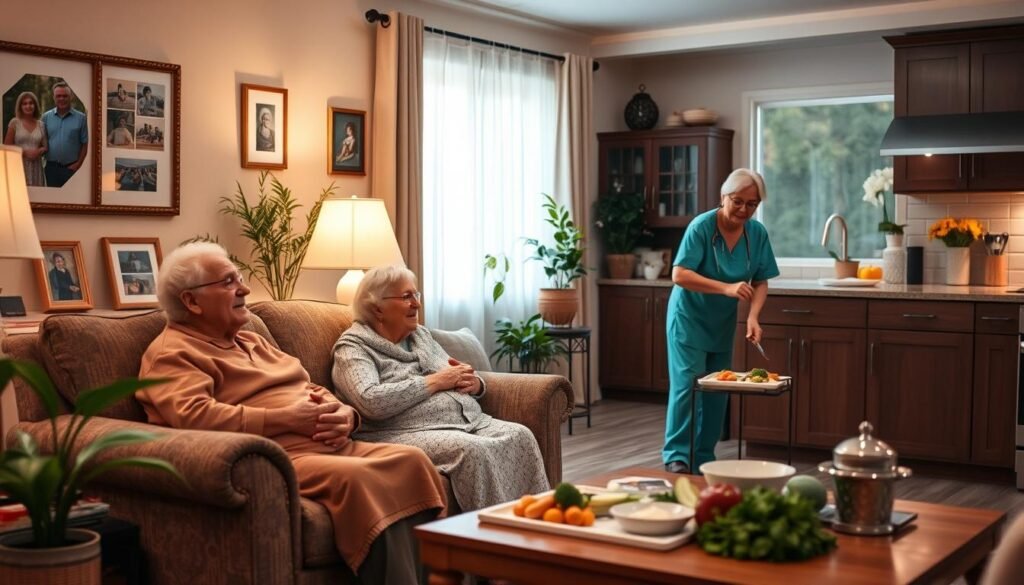Dealing with the challenges of life, caring for our aging parents at home is a big responsibility. It’s a journey filled with love and devotion. But, where do we start? How can we make a safe and caring space for our elderly loved ones? Let’s dive into the key strategies and insights that help families give the best care at home.
Key Takeaways
- Understand the unique physical, cognitive, and emotional needs of aging parents
- Establish a safe and comfortable home environment to support their independence
- Develop a comprehensive caregiving plan that addresses personal care, medication management, and overall well-being
- Seek support from community resources, healthcare professionals, and loved ones
- Cultivate patience, empathy, and a positive mindset to navigate the caregiving journey
Understanding the Challenges of Caring for Elderly Parents
Caring for aging parents at home is rewarding but also challenging. As they get older, they may need more care due to physical and mental changes. It’s important to understand these changes to help them and keep the caregiving relationship strong.
Physical and Cognitive Changes
Older parents might face physical and mental declines. This includes less mobility, chronic pain, hearing or vision loss, and memory issues. These changes can make everyday tasks harder and affect their independence. Caregivers need to adjust and find new ways to help seniors safely and comfortably.
Emotional and Mental Well-being
Looking after elderly parents at home also means focusing on their feelings and mental health. They might feel sad, anxious, or depressed about needing help. Caregivers should be sensitive to these feelings and create a supportive space. Talking openly and getting professional advice, like counseling, can help everyone involved.
| Common Physical and Cognitive Changes | Emotional and Mental Well-being Considerations |
|---|---|
|
|
“Caring for aging parents requires patience, empathy, and a willingness to adapt. By understanding the unique challenges they face, we can create a supportive environment that meets their physical, emotional, and cognitive needs.”
Creating a Safe and Comfortable Home Environment
It’s important to make sure the home of elderly parents is safe and comfy. By adjusting things, caregivers help their aging parents stay independent and live well at home.
Here are some steps to make a safe and comfy home for senior care:
- Install safety features: Use grab bars, non-slip floors, and bright lights to stop falls and accidents.
- Optimize accessibility: Make doorways wider, add ramps, and make moving around easier.
- Enhance the home’s ambiance: Use soft colors, comfy chairs, and personal touches to make it feel welcoming.
- Incorporate assistive technology: Think about smart home gadgets, alert systems, and reminders for meds to help with living alone.
By focusing on safety and comfort, caregivers help their elderly parents stay happy at home. This way, they keep their independence and get better care at home.
| Feature | Benefit |
|---|---|
| Grab bars and non-slip flooring | Less chance of falling and easier moving around |
| Adjustable lighting and wide doorways | Better access and easy movement |
| Comfortable furnishings and personalized decor | Creating a cozy and familiar space |
| Assistive technology (smart home devices, emergency alerts) | Helping with safety and independence |
With these changes, caregivers can make a safe and comfy place for elderly parents to live at home. The goal is to mix practicality with feeling good, making senior in-home care positive and rewarding.

“The greatest gift we can give our elderly parents is the ability to live independently and safely in the comfort of their own homes.”
Caring for Aged Parents at Home: Essential Caregiving Tasks
Caring for elderly parents at home means looking after them in many ways. Key areas include personal care and hygiene, and managing their medications. By focusing on these, caregivers can help keep their aging parents healthy, safe, and happy.
Personal Care and Hygiene
Helping elderly parents with daily care is vital. This includes bathing, grooming, dressing, and using the bathroom. Caregivers should be kind, patient, and focused on keeping their parents’ dignity and independence.
Creating a routine and using special tools can make these tasks easier. This helps both the caregiver and the elderly person.
Medication Management
Managing medications is key for the health and safety of aging parents. Caregivers must keep track of their parents’ medicines. This means making sure they take the right amount, talking to doctors, and watching for any problems.
Using tools like pill boxes or apps can help caregivers stay on top of things. This reduces the chance of mistakes with medicines.
Learning these caregiving tasks helps caregivers support their elderly parents well. They can age comfortably at home, surrounded by what they know.

“The greatest gift you can give your parents is your presence.” – Unknown
Conclusion: Embracing the Journey with Love and Patience
Caring for aged parents at home is both rewarding and tough. This guide showed us how to balance physical, emotional, and logistical support. By using love and patience, families can deeply connect with their aging parents.
Success in home caregiving for seniors comes from adapting to their changing needs. Open communication, empathy, and a desire to learn help create a caring space. This space respects the dignity and freedom of elderly loved ones. Focusing on emotional and spiritual support makes caregiving rewarding for everyone.
Starting this journey of caring for aged parents at home means putting your own needs first. Look for help from community groups, doctors, and other caregivers. With a positive attitude and a commitment to aging parent support, you’ll find joy in caring for your aging parents.
